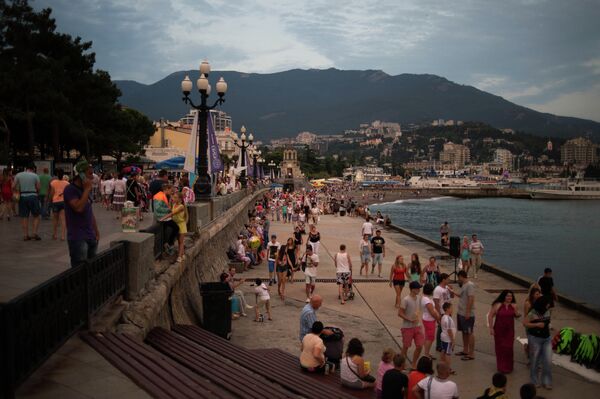MOSCOW, August 15 (RIA Novosti) — Crimea, the subtropical jewel of Russia since 1783, pairs its rich history and culture with its pleasant climate to make it a perfect destination for relaxation and exploration for travelers from around the world.
The peninsula shares the same latitude with Venice, and the summer there is similar to that of the French and Italian Riviera.
The local Vorontsov Palace and the British Buckingham Palace were designed by the same architect, while Livadia palace is famous for having hosted the landmark Yalta conference between Roosevelt, Churchill and Stalin back in 1945.
According to the Russian Association of Tour Operators, 4 million Ukrainians and 2 million Russians used to visit the region every year. Though Crimea seems an extremely attractive area for tourists, it has long experienced a lack of investment, mostly in infrastructure. The latter has largely remained unchanged since the fall of the Soviet Union, which made it a destination for travelers with very basic needs.
“Today Ukrainians, Russians can go to Egypt, Turkey, a lot of places, and find 4-5-star hotels, fully inclusive, so the expectations on infrastructure are pretty high these days. I think it absolutely will require a huge amount of investment to really upgrade the infrastructure, the roads, the hotels, the types of services that hotels offer. I think it's going to be rather difficult to attract this kind of globally experienced hotel managers that really know what to do, but from another standpoint it creates a huge opportunity to Russian investors,” Kendrick White, managing partner at Marchmont Capital Partners, told Radio VR.
Russia's flagship carrier Aeroflot has made the Crimean capital Simferopol the first destination of its new low-cost airline, offering return tickets as cheap as $58 each. However, the city is served by a tiny airport, which needs to be upgraded as well. Official statistics say that Crimea is now Russia's second biggest region in terms of tourist accommodation capacity.
However, 80 percent of the business remains in the gray zone, in other words unregistered and undeclared. Many experts say introducing tax breaks for businesses and establishing a gambling zone should encourage owners to become fully legal. Such incentives would also attract newcomers to the region’s hospitality market.
David Jenkins, Head of JLL's Hotels & Hospitality Group, Russia & CIS, supports the view. “There has been interest before but it's very specific, not high-end because it's been a mass destination and it'll probably remain such. The question of casino is interesting and can stimulate something, for operators it's always been of interest, so we may see some additional investments happening I guess,” he claims.
It seems to be not such an easy task to upgrade a huge area that has been underfunded for years, but what adds optimism is that Russia just recently brilliantly met the Sochi challenge and received an invaluable experience of turning a small town into a diamond resort.


